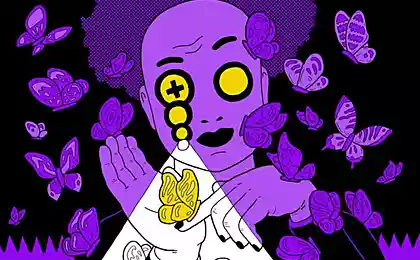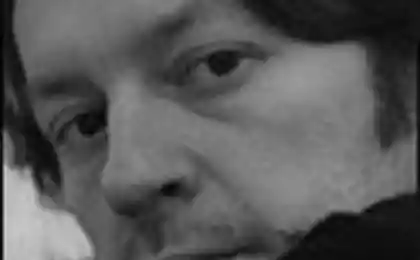516
Writer uh, Zadie Smith: the New story always begins with enthusiasm and ends in shame
Twenty five million five hundred eighty one thousand seven hundred twenty eight
© Nina Bentley
What do not forget, working with the first 20 pages of text, is it possible to break a novel into chapters and why in the process of writing is useful to read Kafka and Dostoevsky? The famous English writer uh, Zadie Smith told the students-writers from Columbia University about the 10 principles of his work. Macro planners and micro managers There are two kinds of writers who, though it sounds clumsy, can be called "macro planners and micro-managers". The first plan of the story before they start writing. Then they can start writing the story from somewhere in the middle. Some of them are five final versions. They removed the heroes from the narrative and return them back, change the order of chapters. For me, it's unthinkable. I start with the first sentence and the last upload. I'm a micro-Manager and build your story gradually, floor by floor. I need to find the right intonation (this search is painful), but then the process goes by itself.
Passed stage Not so long ago over lunch I sat next to one writer from Portugal. I said that I read his first novel. He blushed and replied, "Oh no! At the time I only read Faulkner and I have absolutely no sense of humor. I was a different person!".
"Oh no! I was a different person!"— many authors think so, reading his books. Every new story begins with enthusiasm and ends with shame. Soon after you finish the book, you start to hate her — which means you have to write the following.
The words of others There are writers who will not read a single word other writers, while writing his story. At this time, for them the world of literature is dying. Some authors similar to violinists whose settings need silence and others need to hear all the musicians. I belong to the latter. As I write the story, my Desk is strewn with books by other authors. Reading for me is a balancing diet. If my proposal was too lofty, I take Kafka. If I'm so all estatesir that you can't put a black dot on white paper, I need to stop thinking about what I would say Nabokov, and read Dostoevsky's the patron Saint of the primacy of substance over form.
The middle of the story At some point, somewhere in the middle of writing the story, although not the geographic middle, it's a miracle. Time ceases to exist. You write all night and in one night I can write more words than the last three months. You go outside — a passerby says some phrase, and she was said especially for you. You open the newspaper and every story in it has something to do with your text. Take the book to a random collection of poetry, and find it brilliant epigraph.
If someone has already given consent to the publication of your story, call this man and ask him to postpone, because incredible things happen, the whole world is now tuned in to your story and if it will not be published next Tuesday, you will die.
Chapter While we write a story, we often divide it into chapters — it boosts our confidence, although the text does not crumble without them. I can't begin to write, if not create a structure: for example, three sections, each with ten sections. Structure helps — there is a road, and we are working on a target (even if this goal is artificial).
But when I see your published text, the division of chapters it seems to me not having much sense. The book would have been better off without him. When I did this breakdown, it was vital for me. And then it seemed to me that I have so much time spent on it that it was a pity to cancel. If Chapter helps you when writing the text, use it, but don't forget to remove it later. Or at least give each Chapter a beautiful name — like the Romans for their palaces.
The first 20 pages of the First twenty pages of a work are often crammed with information like sardines. Go back to them and add air. How little we trust our readers and how they just want to chew everything! We are not able to write that so-and-so character just came into the room — will definitely give it a brief biography. Trust your readers — if they mastered Gertrude Stein, do you think that in order to get involved in reading, they need to know from the third page that this character is a social worker whose father just died?
I often think about Agradece of "care of the head of the family," Kafka. This hero looks like a "flat star-shaped spool" rolls down the stairs, dragging the skin. This story is just one page — but curious Odradek I remember more clearly than the characters, which I spent 3 years and 500 pages.
Last day If you're a writer-micromanager, the last day of writing the story for you — this is really the last day. You have made edits along the way, so you have no third or fifth version of their text, the version you have one.
On this day, I feel a happiness that cannot be described in words. Maybe this is the main reason to become a writer — the opportunity to experience this feeling after your text is completed. The last time this happened to me, I got a nice bottle of Sancerre, and drank it standing up, and then lay on the ground in the garden and cried. It was a Sunny day in late autumn, and lay overripe apples.
Put the manuscript on the table You can ignore all my other advice, but this is the main, Golden. The truth is, I never get to use it myself, although one day I hope. Here it is: when you finish your story, if financial needs are not forced to publish it immediately, put the manuscript on the table. To edit your own text, you need to stop being a writer and become a reader, and it takes time.
We often sit with other writers at literary festivals and editable own, already long-published texts a few minutes before a reading. It's not a good coincidence, but it turned out that really there's no better time to do the editing. At this point you see all the meaningless every metaphor, every stupid line, all of your anyone don't need text-decorations — and simply deleted it.
Intolerable cruelty editing Editors are so cruel. Proofreading is a desert in which dying your text and the reality sets in. When I open the envelope with the corrected version of my story, I always feel that now I just have to be a different person if you want to fix it. "Give me all back, I'll start again," is what most want to say at this point. But nobody says, because the fatigue of takes its toll. The desire and strength to change something already there. Therefore, proofreading is so cruel — it appears that when doing anything it's late.
Probably the best proof I've seen in my life — this is a handwritten version of "the waste land" T. S. Eliot, ischitana red pen Ezra pound. His notes were everywhere! And with them it is evident that the draft of "the waste land" — too long, poorly structured, with lines that made no sense to leave. How lucky Elliot that he met Ezra pound! How lucky for Fitzgerald that he met Maxwell Perkins! And where are all these talented editors today?
The finish is very hard for Me to read your own books after they were published. Five years ago, I tried to read "White teeth" and my review com. A year ago in some airport, I saw a copy of "a Collector of autographs" and on a whim bought it. Before you start reading, I had to drink two little bottles of wine handed out on Board. I was able to read two thirds with the same incredible speed with which you read a book that I wrote myself. I have to admit that it didn't seem so bad. For the first time in my life when reading your text, I felt something different from sickness. This book was for me like a stranger. There were whole pages that I didn't know — couldn't remember how he wrote them. Between me and a "Collector of autographs" was reached a temporary truce.
While I was preparing this lecture, I pulled off the shelf "About beauty". Read the third and I again became ill. But in addition to familiar feelings — when you want to rewrite everything, but it's too late — and there are still some new. Sometimes one sentence, sometimes a single paragraph — it really was exactly as I'd like. And this is the feeling I want to experience all of you.
Source: theoryandpractice.ru
© Nina Bentley
What do not forget, working with the first 20 pages of text, is it possible to break a novel into chapters and why in the process of writing is useful to read Kafka and Dostoevsky? The famous English writer uh, Zadie Smith told the students-writers from Columbia University about the 10 principles of his work. Macro planners and micro managers There are two kinds of writers who, though it sounds clumsy, can be called "macro planners and micro-managers". The first plan of the story before they start writing. Then they can start writing the story from somewhere in the middle. Some of them are five final versions. They removed the heroes from the narrative and return them back, change the order of chapters. For me, it's unthinkable. I start with the first sentence and the last upload. I'm a micro-Manager and build your story gradually, floor by floor. I need to find the right intonation (this search is painful), but then the process goes by itself.
Passed stage Not so long ago over lunch I sat next to one writer from Portugal. I said that I read his first novel. He blushed and replied, "Oh no! At the time I only read Faulkner and I have absolutely no sense of humor. I was a different person!".
"Oh no! I was a different person!"— many authors think so, reading his books. Every new story begins with enthusiasm and ends with shame. Soon after you finish the book, you start to hate her — which means you have to write the following.
The words of others There are writers who will not read a single word other writers, while writing his story. At this time, for them the world of literature is dying. Some authors similar to violinists whose settings need silence and others need to hear all the musicians. I belong to the latter. As I write the story, my Desk is strewn with books by other authors. Reading for me is a balancing diet. If my proposal was too lofty, I take Kafka. If I'm so all estatesir that you can't put a black dot on white paper, I need to stop thinking about what I would say Nabokov, and read Dostoevsky's the patron Saint of the primacy of substance over form.
The middle of the story At some point, somewhere in the middle of writing the story, although not the geographic middle, it's a miracle. Time ceases to exist. You write all night and in one night I can write more words than the last three months. You go outside — a passerby says some phrase, and she was said especially for you. You open the newspaper and every story in it has something to do with your text. Take the book to a random collection of poetry, and find it brilliant epigraph.
If someone has already given consent to the publication of your story, call this man and ask him to postpone, because incredible things happen, the whole world is now tuned in to your story and if it will not be published next Tuesday, you will die.
Chapter While we write a story, we often divide it into chapters — it boosts our confidence, although the text does not crumble without them. I can't begin to write, if not create a structure: for example, three sections, each with ten sections. Structure helps — there is a road, and we are working on a target (even if this goal is artificial).
But when I see your published text, the division of chapters it seems to me not having much sense. The book would have been better off without him. When I did this breakdown, it was vital for me. And then it seemed to me that I have so much time spent on it that it was a pity to cancel. If Chapter helps you when writing the text, use it, but don't forget to remove it later. Or at least give each Chapter a beautiful name — like the Romans for their palaces.
The first 20 pages of the First twenty pages of a work are often crammed with information like sardines. Go back to them and add air. How little we trust our readers and how they just want to chew everything! We are not able to write that so-and-so character just came into the room — will definitely give it a brief biography. Trust your readers — if they mastered Gertrude Stein, do you think that in order to get involved in reading, they need to know from the third page that this character is a social worker whose father just died?
I often think about Agradece of "care of the head of the family," Kafka. This hero looks like a "flat star-shaped spool" rolls down the stairs, dragging the skin. This story is just one page — but curious Odradek I remember more clearly than the characters, which I spent 3 years and 500 pages.
Last day If you're a writer-micromanager, the last day of writing the story for you — this is really the last day. You have made edits along the way, so you have no third or fifth version of their text, the version you have one.
On this day, I feel a happiness that cannot be described in words. Maybe this is the main reason to become a writer — the opportunity to experience this feeling after your text is completed. The last time this happened to me, I got a nice bottle of Sancerre, and drank it standing up, and then lay on the ground in the garden and cried. It was a Sunny day in late autumn, and lay overripe apples.
Put the manuscript on the table You can ignore all my other advice, but this is the main, Golden. The truth is, I never get to use it myself, although one day I hope. Here it is: when you finish your story, if financial needs are not forced to publish it immediately, put the manuscript on the table. To edit your own text, you need to stop being a writer and become a reader, and it takes time.
We often sit with other writers at literary festivals and editable own, already long-published texts a few minutes before a reading. It's not a good coincidence, but it turned out that really there's no better time to do the editing. At this point you see all the meaningless every metaphor, every stupid line, all of your anyone don't need text-decorations — and simply deleted it.
Intolerable cruelty editing Editors are so cruel. Proofreading is a desert in which dying your text and the reality sets in. When I open the envelope with the corrected version of my story, I always feel that now I just have to be a different person if you want to fix it. "Give me all back, I'll start again," is what most want to say at this point. But nobody says, because the fatigue of takes its toll. The desire and strength to change something already there. Therefore, proofreading is so cruel — it appears that when doing anything it's late.
Probably the best proof I've seen in my life — this is a handwritten version of "the waste land" T. S. Eliot, ischitana red pen Ezra pound. His notes were everywhere! And with them it is evident that the draft of "the waste land" — too long, poorly structured, with lines that made no sense to leave. How lucky Elliot that he met Ezra pound! How lucky for Fitzgerald that he met Maxwell Perkins! And where are all these talented editors today?
The finish is very hard for Me to read your own books after they were published. Five years ago, I tried to read "White teeth" and my review com. A year ago in some airport, I saw a copy of "a Collector of autographs" and on a whim bought it. Before you start reading, I had to drink two little bottles of wine handed out on Board. I was able to read two thirds with the same incredible speed with which you read a book that I wrote myself. I have to admit that it didn't seem so bad. For the first time in my life when reading your text, I felt something different from sickness. This book was for me like a stranger. There were whole pages that I didn't know — couldn't remember how he wrote them. Between me and a "Collector of autographs" was reached a temporary truce.
While I was preparing this lecture, I pulled off the shelf "About beauty". Read the third and I again became ill. But in addition to familiar feelings — when you want to rewrite everything, but it's too late — and there are still some new. Sometimes one sentence, sometimes a single paragraph — it really was exactly as I'd like. And this is the feeling I want to experience all of you.
Source: theoryandpractice.ru























